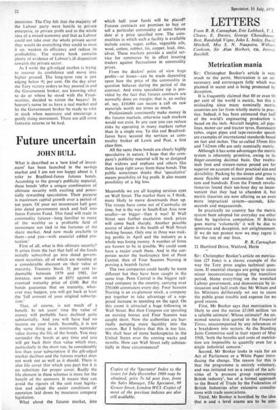Future uncertain
JOHN BULL
What is described as a 'new kind of invest- ment' has been launched in the savings market and I am not too happy about it. I refer to Bradford-Janus futures bonds. According to the group's publicity material, these bonds 'offer a unique combination of ultimate security with exciting and poten- tially rewarding speculation. Their purpose is maximum capital growth over a period of ten years. Of your net investment half goes into dated government stock and half into Janus Futures Fund. This fund will trade in commodity futures—long familiar to many of the wealthy as a profitable field of investment not tied to the fortunes of the share market. And now made available to them—and you—with essential added pro- tection.'
First of all, what is this ultimate security? It arises from the fact that half of the funds initially subscribed go into dated govern- ment securities, all of which are standing at a considerable discount on -their value at maturity. Treasury Stock 31- per cent re- deemable between 1979 and 1981, for instance, now stands at £654- against an eventual maturity price of £100. But the bonds guarantee that on maturity, what- ever may happen, you will get back at least the 'full amount of your original subscrip- tion.'
That, of course, is not much of a benefit. In ten years' time the value of money will probably have declined quite substantially. And you will have had no income on your funds. Second1%, it is not the same thing as a minimum surrender value during the life of the bonds. You may surrender the bonds at any time and you will get back their then value which may, particularly in the short run, be considerably less than your subscription if the gilt-edged market declines and the futures market does not work out as well as it should. There is also life cover (for which you pay) but it is no substitute for proper cover. Really the life element in these schemes is more for the benefit of the sponsors. It means they can avoid the rigours of the unit trust legisla- tion and adopt the easier conditions of operation laid down by insurance company legislation.
What about the futures market, into
which half your funds will be placed? Futures contracts are promises to buy or sell a particular commodity at some future date at a price specified now. The com- modities in which such a facility is available include cocoa, sugar, coffee, vegetable oils, wool, cotton, rubber, tin, copper, lead, zinc, silver. These markets provide a useful ser- vice for commerce by in effect insuring traders against fluctuations in commodity prices.
From the dealers' point of view huge profits—or losses—can be made depending upon how the price of the commodity in question behaves during the period of the contract. And extra speculative zip is pro- vided by the fact that futures contracts are normally done on margin; that is, an outlay of, say, £10,000 can secure a call on raw materials worth ten times as much.
Professionals consistently make money in the futures markets, otherwise such markets would not exist. In any case you can reduce risks by operating in many markets rather than in a single one. To this end Bradford- Janus have secured the services as com- modity broker of Lewis and Peat, a first class firm.
All the same these bonds are clearly highly speculative in nature. I hope that the com- pany's publicity material will be so designed that widows and orphans and others like them keep right away from these bonds. The public sometimes thinks that 'speculative' means possibility of big profit. It also means possibility of a big loss.
Meanwhile we are all keeping anxious eyes on Wall Street. The market there is, I think, more likely to move downwards than up. The troops have come out of Cambodia on time, but is the war in South-East Asia now smaller—or bigger—than it was? If Walt Street sees further escalation stock prices will come back sharply. Another possible source of alarm is the health of Wall Street broking houses. Only one in three was mak- ing profits in April and the industry as a whole was losing money. A number of firms are known to be in trouble. We could soon have a major crash there. And in the cor- porate sector the bankruptcy first of Penn Central, then of Four Seasons Nursing is proving a bearish factor.
The two companies could hardly be more different but they have been caught in the same trap. Penn Central is the biggest rail- road company in the country, carrying over 250,000 commuters every day. Four Seasons Nursing is an ex-glamour stock, a company put together to take advantage of a sup- posed increase in spending on the aged. On this count it attracted a huge following in Wall Street. But then Congress cut spending on nursing homes and Four Seasons was caught short. Now the authorities are hur- riedly pumping more liquidity into the system. But I believe that this is too late. We shall hear of more bankruptcies in the United States over the coming weeks and months. How can Wall Street rally substan- tially in these circumstances?






























 Previous page
Previous page